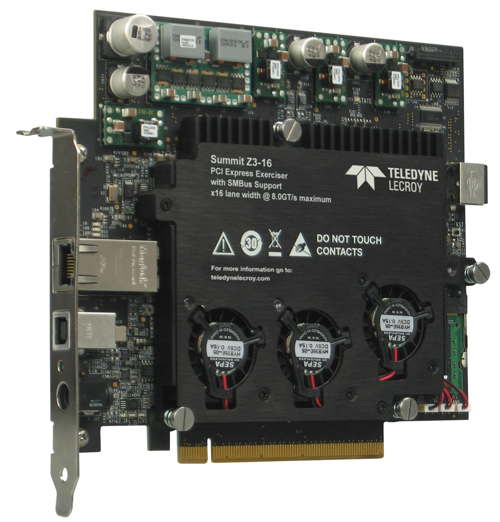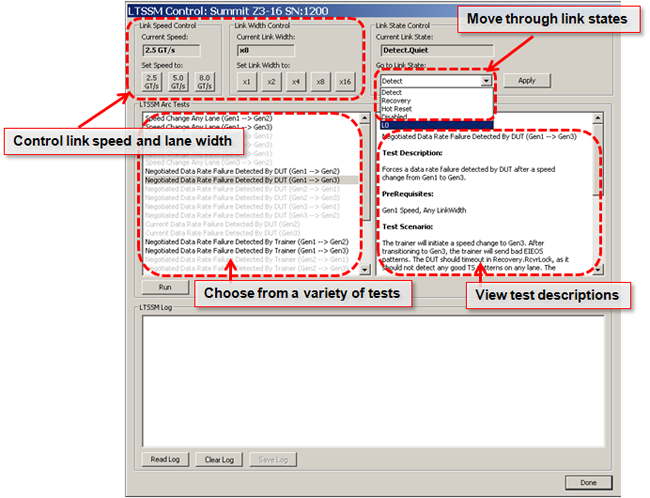From Teledyne LeCroy, NVMe Protocol Analyzer and Exerciser for NVMe Management Interface
For testing and monitoring SSDs and systems using NVMe protocol
This is a Press Release edited by StorageNewsletter.com on July 5, 2016 at 2:42 pmTeledyne LeCroy, Inc. announced the availability of their SMBus protocol-enabled Summit T34 protocol analyzer and Summit Z3-16 exerciser/test platform targeted at testing and monitoring SSDs and systems using the NVMe protocol.

NVMe is associated with high performance storage technology and is now enabling network monitoring in storage systems using PCIe and SMBus signaling which are important components of the NVM Express Management Interface (NVMe-MI) protocol. The Summit T34 protocol analyzer has been enhanced to support SMBus protocol decoding that is integrated into the current NVMe and PCIe protocol traffic trace display. The protocol exerciser/test platform also has been enhanced to generate SMBus protocol traffic which is useful for testing the NVMe-MI protocol in addition to the standard PCIe, NVMe and SATA Express traffic generation already in use by the storage industry.
“The NVMe Management Interface is an important part of delivering a robust SSD solution for Datacenter environments,” said Amber Huffman, president, NVM Express, Inc. “Protocol tools like the Summit T34 Analyzer and Summit Z3-16 Exerciser from Teledyne LeCroy will help the NVMe ecosystem grow by providing engineers with the tools they need to successfully complete challenging development schedules.“
Click to enlarge

A data center is made up of a multitude of servers each with hundreds of SSDs. Failures happen from time-to-time causing potential data loss. To avoid this problem, BMC (Baseboard Management Controller) systems monitor storage devices and determine if there is a drop in performance or change in operating conditions. Pre-emptive action allows problem units to be identified and replaced maintaining high quality data access. The NVMe-MI protocol enables NVMe SSDs to be managed by the BMC over either SMBus (out-of-band) or PCIe (in-band). The Summit T34 and Summit Z3-16 are a part of system development to verify that the solution is working according to the NVMe-MI specification.
“Network monitoring is becoming more important as big data is consolidated to compact systems and devices,” said John Wiedemeier, product marketing manager, protocol solutions group, Teledyne LeCroy. “The new Summit T34 Protocol Analyzer and Z3-16 Exerciser tools will allow developers to monitor and test NVMe-MI applications for various device form factors to ensure high quality systems.“
Traffic between the Host (Root Complex) and the DUT (Device Under Test) will be captured by a new class of interposers that have been developed to support both PCIe and SMBus channels. These interposers include the PCIe External Cable 3.0 Interposer, standard interposers with the CEM connector and other specialized form factors coming soon. The sideband signaling PERST#, WAKE#, and similar functionality can be monitored by the Summit T34 through the interposer, where protocol issues and performance metrics can be analyzed and debugged. RefCLK# signals external to the cable are available on the PCIe External Cable 3.0 interposer for use with the protocol analyzer.
In 2010, the company was the first firm to introduce a PCIe protocol analyzer supporting NVMe. Since that time the company has added decoding for SATA Express (AHCI/PCIe) and specific probing for U.2 (SFF-8639) and M.2 connector-based storage system and devices. Integrating these PCIe SSD technologies into a single protocol analyzer, and adding targeted storage probing solutions, provides developers versatile tools that can show essential details regarding proper data transmission and bus performance. These tools have been critical to the success of PCIe SSD interoperability testing that has occurred over the last few years.
The Summit T34 Protocol Analyzer, Summit Z3-16 Exerciser and Test Platform, and the interposers are available to order.













 Subscribe to our free daily newsletter
Subscribe to our free daily newsletter

